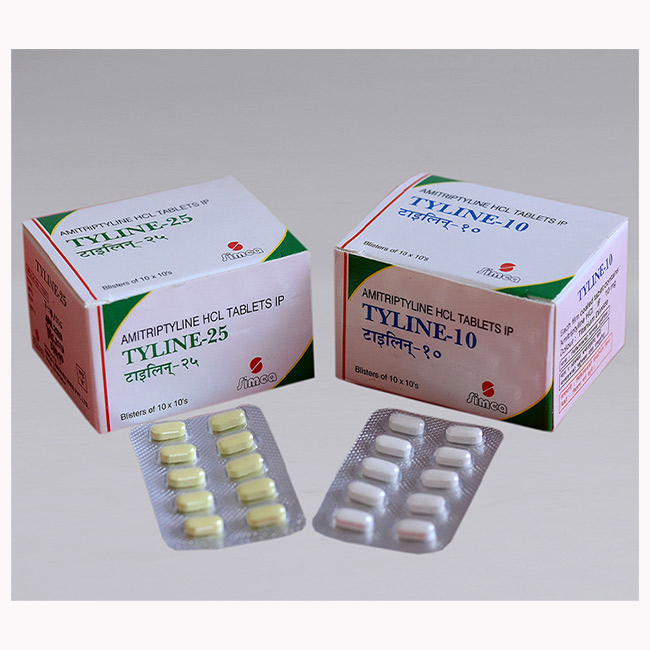Tyline
Generic composition: Amytryptyline HCl
General description
Tyline is Amitriptyline HCl, a dibenzocycloheptadiene derivative, is a white, or practically white, odourless, crystalline compound which is freely soluble in water and alcohol. Tyline is a tricyclic antidepressant (TCA) with analgesic properties, widely used to treat depression and neuropathic pain.
Therapeutic Group:
- Tricyclic Antidepressant(TCA)
Dosage forms available
- TYLINE 10mg Tablets
- TYLINE 25mg Tablets
Uses
- Endogenous Depression, Anxiety.
- Offlabel use: Chronic pain management in diabetic nephropathy, peripheral nerve disease, fibromyalgia etc.
Dosage
- 75 mg daily in divided dose or 50-100 mg bedtime; can be increased up to 150mg per day. Maintenance dose of 50-100 mg per day preferably bedtime after satisfactory improvement seen.
- Not recommended for children under 12 yrs
Mechanism of Action
Amitriptyline inhibits the membrane pump mechanism responsible for re-uptake of norepinephrine and serotonin post-synaptic neurons. Pharmacologically, this action may potentiate or prolong neuronal activity since reuptake of these biogenic amines is important physiologically in terminating transmitting activity.
Pharmacokinetics
Absorption: Rapidly absorbed, bioavailability is 30-60% due to first pass metabolism, peak plasma concentrations are reached 2-12 hours after oral or intramuscular administration
Distribution: Apparent volume of distribution estimated after intravenous administration is 1221 L±280 L; range 769-1702 L (16±3 L/kg), it is found widely distributed throughout the body
Metabolism: metabolism of amitriptyline occurs mainly by demethylation (CYP2C19, CYP3A4) as well as hydroxylation (CYP2D6) followed by conjugation with glucuronic acid. The main active metabolite is the secondary amine, nortriptyline.
Elimination: Amitriptyline and its metabolites are mainly excreted in the urine
Half-life: elimination half-life of amitriptyline after oral administration is about 25 hours.
Adverse effects:
Common side effects include dizziness, headache, weight gain, side effects common to anticholinergics, cognitive effects such as delirium and confusion, mood disturbances such as anxiety and agitation, cardiovascular side effects such as orthostatic hypotension, sinus tachycardia, and QT-interval prolongation, sexual side effects such as loss of libido and impotence, sleep disturbances such as drowsiness, insomnia and nightmares, blurred vision and hepatic failure.
Contraindications:
- In patients who have shown prior hypersensitivity to it.
- It should not be given concomitantly with Monoamine Oxidase Inhibitors (MAOIs). Hyperpyretic crises, severe convulsions, and deaths have occurred in patients receiving TCAs and MOAIs given simultaneously. A minimum of 14 days interval should be allowed between administrations of two.
- Should not be given with Cisapride due to the potential for increased QT interval and increased risk for arrhythmia.
- Not recommended for use during the acute recovery phase following myocardial infarction.
Precautions:
- Gradual withdrawal recommended.
- Pregnancy category C
- Schizophrenia or manic depression
- Increase in suicidal tendency
- Caution in hepatic impairment
- Reduced dose for elderly patients recommended
Drug Interactions:
- Topiramate
- Cardiovascular drugs like quinidine, antiarrhythmics like propafenone and flecainide.
- Caution is indicated in the co-administration of TCAs with any of the SSRIs and also in switching from one class to the other especially with fluoxetine, because of long half-life and active metabolite.
- Caution when Amitriptyline given with anticholinergic agents or sympathomimetic drugs, including epinephrine combined with local anesthetics; hyperpyrexia has been reported.
- Concurrent administration with ethchlorvynol: Transient delirium has been reported.
- Amitriptyline hydrochloride may block the antihypertensive action of guanethidine or similarly acting compounds.
- Caution in patients with history of seizures.
- Close supervision is required when Amitriptyline hydrochloride is given to hyperthyroid patients or that receiving thyroid medication.
- Cimetidine, phenothiazines, carbamazepine; alters metabolism of Amitriptyline.
- Amitriptyline may enhance the response to alcohol and the effects of barbiturates and other CNS depressants.
- Delirium has been reported with concurrent administration of Amitriptyline and disulfiram.
Advantages:
- There is evidence that the TCAs (esp Amitriptyline) are more efficacious for severe (melancholic/endogenous) depression than SSRIs and proven analgesic effects
- The only documented and most widely used prophylactic therapy for chronic tension-type headache
- Small efficacy advantage over other tricyclic antidepressants
- Relatively early onset of antidepressive effect
- Fewer gastrointestinal and sexual side effects than SSRIs.


